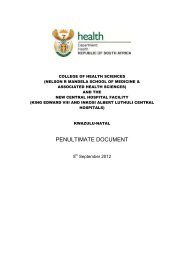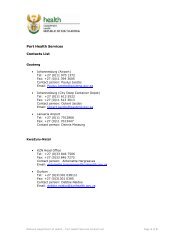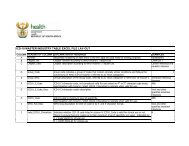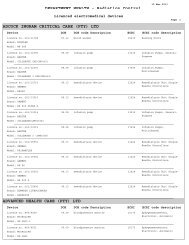Dealing with <strong>and</strong> reporting of incidents <strong>and</strong> accidents. Interpretation of material safety data sheetsRecord of such trainings need <strong>to</strong> be kept for a period of at least five yearsd) ImmunizationThe facility’s health <strong>and</strong> safety policy must make provision for appropriate immunization in the event ofaccidental needle stick injuries <strong>and</strong> other accidents involving the h<strong>and</strong>ling of HCRW <strong>to</strong> prevent the spreadof any communicable disease.SECTION 12: COMMUNITY AWARENESS AND EDUCATIONa) Waste management awareness <strong>and</strong> education campaigns is critical as part of community education,therefore EHPs should conduct waste management awareness raising, education <strong>and</strong> promotion incommunities on “ the management of HCRW at a household level <strong>and</strong> general waste management”as part of compliance inspections <strong>and</strong> health education activities.b) Each campaign should have an action plan, detailing the campaign date, venue, target group,objectives of the campaign, campaign activities, stakeholders involved, education materials <strong>to</strong> beused, <strong>and</strong> costs implications.c) The campaign shall also have a feedback report detailing all aspects included in the action plan aswell as campaign impact <strong>and</strong> recommendations.d) Such campaigns shall target formal <strong>and</strong> informal recyclers, health care facilities, business owners <strong>and</strong>the general public, especially schools.e) These campaigns shall also be done jointly with relevant internal <strong>and</strong> external stakeholders; <strong>and</strong> thepublic.SECTION 13: ENVIRONMENTAL HEALTH INSPECTIONS1. EHPs should moni<strong>to</strong>r waste management activities (waste minimization, separation, collections,s<strong>to</strong>rage, transportation <strong>and</strong> disposal), at different residential, business, industrial, places of care <strong>and</strong>health care facilities at all times during routine or follow inspections as planned <strong>and</strong> as prescribed inthe norms <strong>and</strong> st<strong>and</strong>ards for health surveillance of the premises.2. General <strong>and</strong> hazardous l<strong>and</strong>fill sites should be inspected at least twice per year; <strong>and</strong> during preoperation, during closer <strong>and</strong> after closer.3. All required permits, waste management plans; waste information records <strong>and</strong> environmental impactassessment reports should be inspected.4. Site plans of premises generating business, industrial <strong>and</strong> hazardous, including health care riskwaste, should be evaluated for conformances <strong>to</strong> relevant legislation specifying requirements for wastes<strong>to</strong>rage areas.5. An EHP should moni<strong>to</strong>r the collection <strong>and</strong> management of waste during events (festivals, sports, etc)throughout the period of the particular event.6. Condemned foodstuffs must be collected, transported <strong>and</strong> disposed of in the presence of an EHP,who shall moni<strong>to</strong>r all processes <strong>to</strong> ensure that condemned waste is effectively managed untildisposal.7. EHPs should keep records of inspections, findings <strong>and</strong> recommendations of all inspections conductedon premises generating waste, particularly hazardous, <strong>and</strong> health care risk waste.8. An inven<strong>to</strong>ry of premises generating <strong>and</strong> h<strong>and</strong>ling hazardous <strong>and</strong> HCRW must be kept by EH.9. Inspection report with recommendations should be provided <strong>to</strong> the person in charge of the premisesafter conducting inspection.10. Routine inspection programmes for closed l<strong>and</strong>fill sites should be established <strong>and</strong> implemented by anEHP.11. Inspection checklist as per Annexure C shall be completed for all waste management inspectionsSECTION 14: INTERSECTORAL COLLABORATION<strong>Environmental</strong> <strong>Health</strong> Practitioners need <strong>to</strong> establish strong relationships, with various stakeholders, suchas Department of Transport, Department of Agriculture, Department of Labour, Department of Minerals<strong>and</strong> Energy, private sec<strong>to</strong>r waste companies, in the waste industry in order <strong>to</strong> win the battle against poormanagement of waste in South Africa.DOH. <strong>Norms</strong> <strong>and</strong> st<strong>and</strong>ards for environmental health in South Africa Feb 2013 132
Relationships between transboundary provincial <strong>and</strong> municipalities also need <strong>to</strong> be strengthened in order<strong>to</strong> easily address transboundary waste management issues, Memor<strong>and</strong>um of underst<strong>and</strong>ing may besigned where deemed necessary.In municipalities, environmental health department should build strong relations with other wastemanagement department/utility or contracted company, which renders waste management services, suchas collection, transport <strong>and</strong> disposal for the particular municipality.Waste management forums need <strong>to</strong> be established between relevant government departments <strong>and</strong>municipalities <strong>and</strong> local waste recycling companies, nongovernmental organizations interested in waste,management, schools, businesses <strong>and</strong> the community. <strong>Environmental</strong> health institutions <strong>and</strong> practitionersneed <strong>to</strong> actively participate in those forums.SECTION 15: CAPACITY BUILDING AND TRAINING1. There is a need for various training aspects in the field of waste management, which should focus onvarious role players in the waste management sec<strong>to</strong>r, including in the field of waste h<strong>and</strong>ling. Roleplayers in with waste management should ensure that they are kept abreast with new technologies,new concepts, new innovations <strong>and</strong> new ideas in the fields of waste by attending conferences,seminars <strong>and</strong> workshops, <strong>to</strong> enable management of waste in line with current <strong>and</strong> developing trends.2. Waste management field workers (from street cleansing <strong>to</strong> disposal of general <strong>and</strong> hazardous waste)should be provided with training <strong>and</strong> information on the risks involved in the h<strong>and</strong>ling of waste <strong>and</strong> theimportance of personal hygiene <strong>and</strong> wearing appropriate protective clothing at all times whileengaged in waste h<strong>and</strong>ling.3. EHPs, infection control nurses, quality assurance officers, relevant management of relevantworkplaces, health <strong>and</strong> safety officers <strong>and</strong> health <strong>and</strong> safety representatives should also be trainedas trainers in relevant aspects of waste management related <strong>to</strong> their duties. Training must beconducted by accredited institutions <strong>and</strong> trainers.4. In-service <strong>and</strong> refresher training need <strong>to</strong> be conducted periodically <strong>and</strong> records thereof should beupdated <strong>and</strong> kept for a period of at least 5 years.5. It is recommended that major waste genera<strong>to</strong>rs, including genera<strong>to</strong>rs of health care risk waste <strong>and</strong>hazardous waste genera<strong>to</strong>rs appoint a waste management officer, <strong>to</strong> moni<strong>to</strong>r <strong>and</strong> ensure soundmanagement of waste in the facility.6. Human resource capacity of all people, which can play a major role in good waste management,should be addressed by the public sec<strong>to</strong>r, private sec<strong>to</strong>r, <strong>and</strong> non-governmental organizationsSECTION 16: MONITORING, EVALUATION AND DATA REPORTINGThe moni<strong>to</strong>ring <strong>and</strong> evaluation of waste management activities by <strong>Environmental</strong> <strong>Health</strong> Practitioners <strong>and</strong>other role players is essential for effective waste management. All data collected need <strong>to</strong> be analyzed,interpreted <strong>and</strong> reported, where required. The quality of moni<strong>to</strong>ring, evaluations conducted as well asdata reported need <strong>to</strong> be analyzed, <strong>and</strong> strengthened where necessary.SECTION 17: COMPLIANCE ENFORCEMENT1. EHPs must investigate any non conformances in relation <strong>to</strong> waste management <strong>and</strong> take appropriateaction.2. The following aspects of waste management shall be reported within 24 hours of identification <strong>to</strong> therelevant authorities as outlined in the table below for further action:Table:Waste management aspect• Unpermitted <strong>and</strong> unlicensed facilities.• Waste management activities operating withoutthe necessary environmental authorization, forbasic assessment or EIA• Unsafe h<strong>and</strong>ling of radioactive waste <strong>and</strong> illegaldumping thereofRelevant authorityDepartment of <strong>Environmental</strong> AffairsDepartment of <strong>Health</strong>: Radiation ControlDOH. <strong>Norms</strong> <strong>and</strong> st<strong>and</strong>ards for environmental health in South Africa Feb 2013 133
- Page 1 and 2:
No. 36849 GOVERNMENT GAZETTE, 20 SE
- Page 3 and 4:
AcknowledgementsDrafting Team (Nati
- Page 5 and 6:
Preamble by Director-GeneralThe Nat
- Page 7 and 8:
POLICY AND LEGISLATIVE FRAMEWORKThe
- Page 9 and 10:
1. Introduction1.1 Policy contextOn
- Page 11 and 12:
5. Monitoring and enforcing complia
- Page 13 and 14:
BACKGROUNDHealth surveillance of pr
- Page 15 and 16:
h) Adequate and potable water avail
- Page 17 and 18:
a) Entrance and exit control must b
- Page 19 and 20:
• Storage of unsafe, toxic, dange
- Page 21 and 22:
(i) For children between 0-24 month
- Page 23 and 24:
• The health certificate holder,
- Page 25 and 26:
a) Separate storage facilities must
- Page 27 and 28:
2.4 Inspections should include an a
- Page 29 and 30:
g) Adequate facilities must be prov
- Page 31 and 32:
d) Corridors must be at least 1.8m
- Page 33 and 34:
1. NORMS1.1 Schools to be operated
- Page 35 and 36:
• A cardiopulmonary mouthpiece pr
- Page 37 and 38:
a) All circumcisions must be conduc
- Page 39 and 40:
) Toilets, wash hand basins and bat
- Page 41 and 42:
• Liquid soap;• First aid instr
- Page 43 and 44:
h) A daily record must be kept on t
- Page 45 and 46:
t) A separate room or area with sep
- Page 47 and 48:
h) An adequate number of purpose-ma
- Page 49 and 50:
c) Health care facilities should ha
- Page 51 and 52:
a) All facilities used in connectio
- Page 53 and 54:
5. General hygiene requirementsa) T
- Page 55 and 56:
1.1 The premises operated under a v
- Page 57 and 58:
5. Environmental health should cond
- Page 59 and 60:
d) The use of non-waterborne sanita
- Page 61 and 62:
so many kgs of manure is produced p
- Page 63 and 64:
a) On any residential premises, onl
- Page 65 and 66:
n) A rodent-proof storeroom must be
- Page 67 and 68:
d) Pets must be vaccinated against
- Page 69 and 70:
1.3 The premises in compliance with
- Page 71 and 72:
2.1 Environmental health inspection
- Page 73 and 74:
2.1 Environmental health inspection
- Page 75 and 76:
1) Responsibility of management1.1.
- Page 77 and 78:
that all possible health impacts of
- Page 79 and 80:
BACKGROUNDThe Scope of Profession o
- Page 81 and 82: a) An Integrated Disease Surveillan
- Page 83 and 84: a) All food onboard must be stored
- Page 85 and 86: 3. Waste managementa) The managemen
- Page 87 and 88: c) Documents outlining prevention,
- Page 89 and 90: Chapter 3HEALTH RELATED WATER QUALI
- Page 91 and 92: d) The catchment (rivers, treatment
- Page 93 and 94: f) Ensuring monitoring of effective
- Page 95 and 96: SECTION 4:WATER QUALITY MONITORING
- Page 97 and 98: water world etc)1. In the event of
- Page 99 and 100: Step 2: if water is obtained from t
- Page 101 and 102: • Of the time frame, if any, with
- Page 103 and 104: 3. Household grey-water (generated
- Page 105 and 106: SECTION 14:MONITORING OF DRINKING W
- Page 107 and 108: contamination (e.g. from birds and
- Page 109 and 110: SECTION 21: COMPLIANCE ENFORCEMENT6
- Page 111 and 112: DEFINITION OF APPLICABLE TERMSThe f
- Page 113 and 114: BACKGROUNDWaste management is the c
- Page 115 and 116: • Provides municipal health servi
- Page 117 and 118: a) The premises used for recycling
- Page 119 and 120: SECTION 4: COLLECTION OF GENERAL WA
- Page 121 and 122: SECTION 7: CLASSIFICATION, PACKAGIN
- Page 123 and 124: • The spillage area shall be mark
- Page 125 and 126: • Elbow length heavy duty gloves,
- Page 127 and 128: anatomical waste anatomical • Hav
- Page 129 and 130: • Waste oxidizing substances and
- Page 131: Sharps container 90 days Cool room
- Page 135 and 136: Chapter 5HAZARDOUS SUBSTANCES AND C
- Page 137 and 138: 3. The premises used in connection
- Page 139 and 140: d) In addition, all hazardous subst
- Page 141 and 142: 4. Guidelines for Drinking Water Qu
- Page 143 and 144: for conducting monitoring.7. Analyz
- Page 145 and 146: Bacterial infectionsCholeraCampylob
- Page 147: paralytic aspeticmeningitis. The re


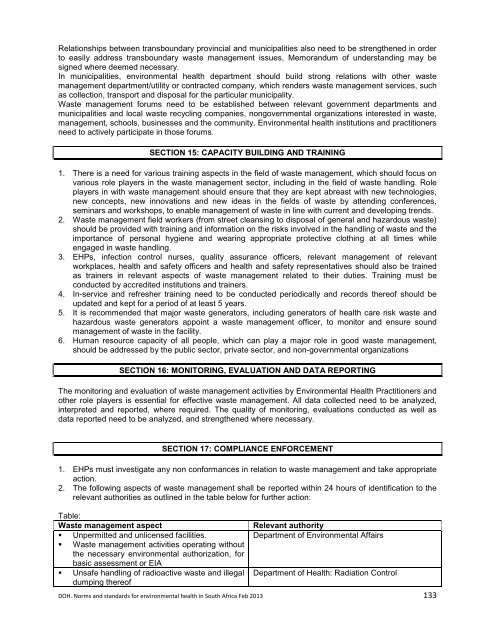
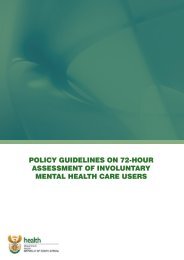
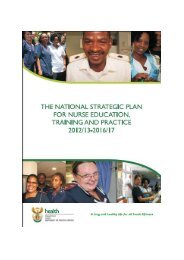
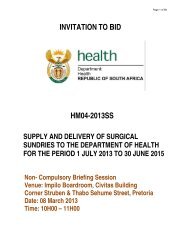
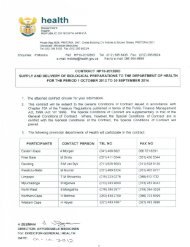
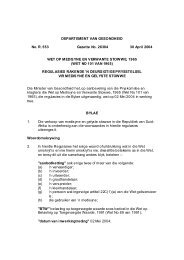
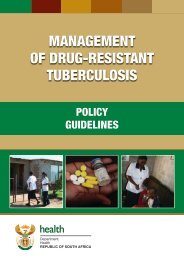
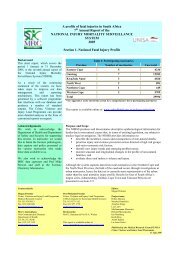
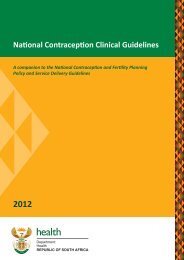
![A monograph of the management of postpartum haemorrhage [2011]](https://img.yumpu.com/15578784/1/184x260/a-monograph-of-the-management-of-postpartum-haemorrhage-2011.jpg?quality=85)
